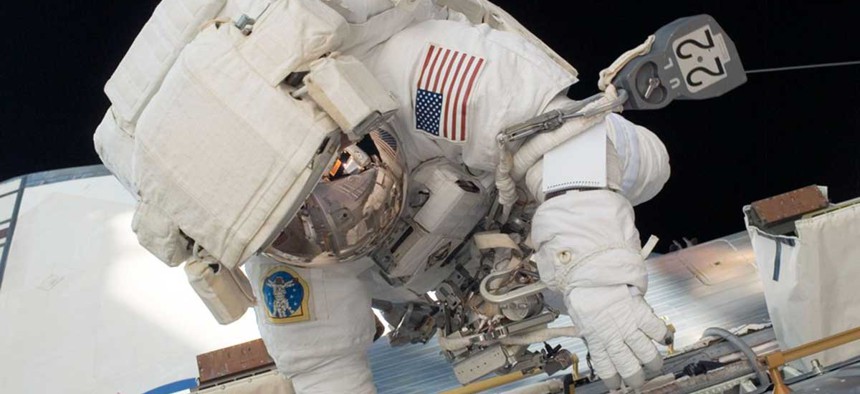
Ron Garan participated in four spacewalks. NASA
Astronaut Ron Garan: Space Travel For All Will Make Earth a Better Place
In a Q&A, the former NASA astronaut speaks his mind about space travel, terraforming and religion.
here is a small but growing set of people who have had the opportunity to see the Earth as a planet, and view its changing seasons and weather patterns from above. Astronauts are a rare breed: men, and, increasingly, women, who have orbited the Earth and seen it suspended below them as a canvas of colour and movement. Astronauts who have gone even further have seen it turn into the “pale blue dot” described so emotively by Carl Sagan.
I caught up with former NASA astronaut Ron Garan, who has both flown and walked in space, at the One Young World Environment Summit . More often than not the pictures we see of and from space are accompanied by commentary – so to kick things off I wanted to know whether the International Space Station (ISS) is as silent as space itself.
What does the ISS sound like?
There is noise all the time – from fans and pumps, as well as radio communications.
Did you ever get any time to yourself?
The ISS is not a small place – it is about the size of a football field [presumably American football, not soccer]. Sometimes you might be on a task that takes you away from the other crew, and you might not see them for an entire working day. Even though every hour was always scheduled, occasionally floating over to the window to look at Earth gave wonderful moments of solitude.
Did you get lonely?
Well, clearly, you miss your loved ones, but you are with other people –- and hopefully you like those other people. I can imagine if you didn’t get on with the rest of the crew it could be pretty lonely, but I didn’t have that experience.
What was it like having cameras following your every move?
It wasn’t just mission control watching by camera, but everything was broadcast over NASA TV. Thousands of people might be watching you have breakfast. Luckily the cameras don’t point everywhere, and they could be switched off.

Ron Garan prepares the reentry breakup recorder at the ISS, June 19 2011. NASA
Is it feasible that regular people with no training will be able to leave Earth?
My first flight was a two-week stint on the Space Shuttle, and my second a six-month stay on the ISS. They both required specific, and different, skills and capabilities. However, to put it in perspective: the first cohorts of airplane passengers were not the general public. Yet flying is now commonplace, and we don’t even think of the ages or backgrounds of the passengers. It is accepted as a normality. Eventually, space travel will reach this level – and I look forward to that.
As chief pilot for a company that will offer balloon flights to space, do you find any conflict between space tourism and protecting the environment?
Not at all. First of all, although the company does have a branch that covers space tourism, the main focus is to provide platforms on balloons for similar activities that are carried out by orbiting satellites: communications, Earth observation, weather, etc. There are holes in our collection of human knowledge that we have about the upper atmosphere, and this limits how we can model climate change, weather patterns and so on.
We intend to fly research platforms that will give us a better understanding of the upper atmosphere. We can also reestablish communications during disasters when communications go down, during forest fires or for other agricultural and environmental applications.
When we do fly people in space – though I wouldn’t use the phrase “space tourism” – I believe the more people who can see our planet from the perspective of space, the better off we are down here. I don’t know of anybody who has been to space who doesn’t have a greater appreciation for the ecosystem that we call Earth.
Precious helium is used in balloons, so what are the resource implications?
Helium is a byproduct of the petroleum industry, and so the company was using something that otherwise went to waste. But in the future, as soon as possible, we plan to use hydrogen, which is cheaper than helium as it can be made from water.

Ron Garan in front of the Soyuz booster that carried him to the ISS in 2011. NASA
If we made such a mess of the Earth that we had to leave, would we have the moral or ethical right to travel to terraform Mars?
We can’t terraform the Earth, so I’m not sure we could terraform Mars. I don’t really know the answer. Maybe I lean more towards yes, but if we got to the point that we could terraform Mars, then we should also be able to fix the Earth. Then Mars becomes another place where life flourishes. Another point is that a single planetary species tends not to survive. Mars could be like Noah’s Ark, with a place to conserve many species in the eventuality that Earth became uninhabitable.
You’re a Catholic. Did being in space enhance your spirituality?
It enhanced a lot of things, not just spiritual, but responsibility – the idea of leaving behind a better place than we found it. It reinforced the idea of taking care of people and the Earth. My circle of kinship has increased, from beyond family and country to the entire planet. A lot of the beliefs I held before were reinforced by the experience of being in space.
![]()
This post originally appeared at The Conversation . Follow @ConversationUS on Twitter.






